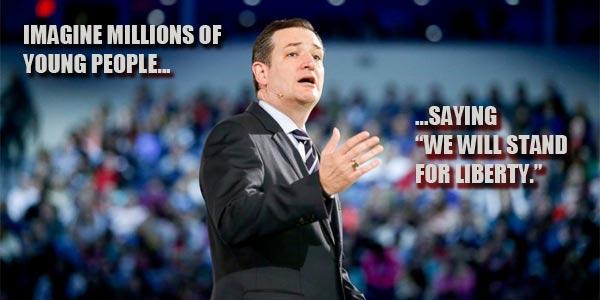 Ted Cruz took Iowa after winning a third of the evangelical vote. Rubio and Trump each won about 20 percent. Washington Post But the 2016 GOP race is distinctive because there are so many candidates trying to woo evangelicals – the three mentioned plus Ben Carson, Mike Huckabee, and Rick Santorum.
Ted Cruz took Iowa after winning a third of the evangelical vote. Rubio and Trump each won about 20 percent. Washington Post But the 2016 GOP race is distinctive because there are so many candidates trying to woo evangelicals – the three mentioned plus Ben Carson, Mike Huckabee, and Rick Santorum.
A long article in New York Times Magazine describes how Cruz formulated his game plan to throw the dice on evangelicals. “[I]f just an additional 10 million evangelicals showed up, the election would be over,” Cruz wrote in an epilogue to his father’s book (A Time for Action by Rafael Cruz – excerpts at WND). Born again or evangelical Christians represented 57 percent of 2012 Iowa Caucus participants, even though they are only 28 percent of Iowa’s population. Iowa Caucus Project In the 2016 race, 63.8 percent of delegates to be earned before March 8th are from states where white evangelicals are half or more than half of the electorate. University of Virginia Center for Politics.
Cruz’ strategy is similar to how he won his run-off election for the GOP nomination for the U.S. Senate against a stalwart conservative, Lt. Gov. David Dewhurst, who was the GOP establishment’s favorite. Rafael Cruz worked crowds, telling them Christians need to be involved in politics: ‘‘God is saying to you: ‘Vote for righteous people.’ ’’
Politically, Ted Cruz came out of the Tea Party and still occasionally attends Kingwood Tea Party meetings in Houston. In Iowa, Cruz bridged the Tea Party and evangelical votes by speaking to both. “There is a spirit of revival that is sweeping this country,’’ he told Iowans. ‘‘The men and women of this room scare the living daylights out of Washington. And when politicians are terrified, liberty is never safer.” Cruz, foe of the political establishment and winner of the Tea Party Patriots Citizens Fund primary of 50,000 voters, reminded evangelicals in Iowa about the ‘‘Judeo-Christian values’’ that made America ‘‘that shining city on the hill.’’ All of this echoes Ronald Reagan, who attended prayer breakfasts and appealed to libertarian voters.
Cruz’ strategy in the 2016 race includes endorsements from key faith leaders like Dr. James Dobson, who joined the candidate on the Iowa campaign trail. Longtime Cruz supporter David Barton hosted a gathering for Cruz with 300 ‘faith leaders on a Texas ranch. The Cruz campaign has worked diligently to raise awareness among voters, succeeding in making ‘Christian’ and ‘evangelical’ prominent in online word-cloud analysis of mentions of Cruz.
‘Authenticity’ is the watchword for this cycle – with Sanders, Trump, and Cruz scoring high in this department. At the Barton gathering, the participants were pleasantly surprised that Cruz was comfortable praying for the country with them. They had reason to be skeptical, having been bashed by the Republican establishment for so long – called unintellectual, lacking in curiosity, and worse (Ace of Spades HQ). Cruz’ affinity for evangelicals appears to be genuine, both with him and among his campaign staff who are given to bowing their heads in prayer together.
This has been called a “base election” and commentators speculate Cruz would do a better job than Hillary Clinton of turning out the base. Still, it’s a tall order – not only getting registered evangelical voters to show up at the polls but also recruiting legions of unregistered evangelicals whose votes will be needed to put the eventual GOP nominee over the top in November. The Republican establishment continues to scoff, believing there simply aren’t enough of these voters to win. If evangelicals stay home again, not voting for Cruz or anyone else, we can look forward to hearing the establishment say, ‘see, we told you so.’
In the News
- With 64% of Iowa caucus voters being evangelicals and evangelicals breaking at a higher rate than the rest of the electorate for Cruz, Tony Perkins, president of the Family Research Council, proclaims the “Ted Effect.” Christian Post
- Some evangelicals feel like their faith may be given excessive “lip service” by candidates and one pastor says he is not electing “pastor-in-chief” NPR
- There may be two types of evangelicals: one that believes in culture wars and mixing politics and religion, and the other believing that church and state should stay separate. Cornell Daily Sun
